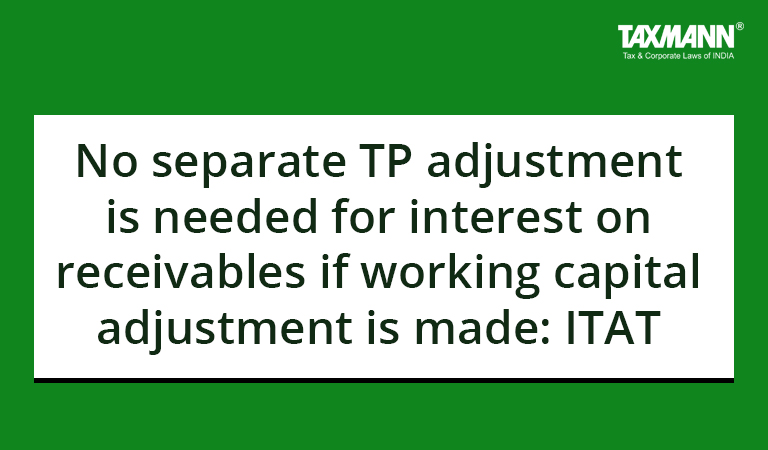No separate TP adjustment is needed for interest on receivables if working capital adjustment is made: ITAT
- News|Blog|Transfer Pricing|
- 2 Min Read
- By Taxmann
- |
- Last Updated on 6 December, 2021

Case Details: ERM India (P.) Ltd. v. NeAC - [2021] 132 taxmann.com 220 (Delhi - Trib.)
Judiciary and Counsel Details
-
- Anil Chaturvedi, Accountant Member and K. Narasimha Chary, Judicial Member
- Ajit Jain, A.R. and Arpan Khanna, CA for the Appellant.
- Bhagwati Charan, Sr. DR for the Respondent.
Facts of the Case
Assessee-company made international transactions with Associated Enterprises. TPO suggested enhancing income of assessee on account of interest on receivables from AEs. Assessee submitted that TPO erroneously considered continuing debit balance of receivables from AEs as an “unsecured interest-free loan” granted by assessee to its AE’s during relevant previous year.
According to assessee, once the primary transaction of provision/receipt of consultancy services was held to be at arm’s length price, then intercompany receivables arising therefrom (being consequential and closely linked to the main transaction) also conform to arm’s length principle, and it was a debt-free company, and therefore no borrowed funds were utilised to grant extra credit period to AEs.
ITAT Held
The Delhi Tribunal held, following the ruling of ITAT delivered in the case of Kusum Healthcare (P.) Ltd. v. Asstt. CIT [2015] 62 taxmann.com 79 held that no additional imputation of interest on outstanding receivables is warranted if the pricing/profitability of assessee is more than the working capital adjusted margin of comparables companies. Thus, the addition made on account of interest on receivables cannot be sustained.
Case Review
-
- Kusum Healthcare (P.) Ltd. v. Asstt. CIT [2015] 62 taxmann.com 79 (Delhi – Trib.) (para 11) followed.
List of Cases Referred to
-
- Pr. CIT v. Kusum Health Care (P.) Ltd. [2018] 99 taxmann.com 431/[2017] 398 ITR 66 (Delhi) (para 3)
- CIT v. Patni Computer Systems Ltd. [2013] 33 taxmann.com 3/215 Taxman 108 (Bom.) (para 4)
- Bechtel India (P.) Ltd. v. Asstt. CIT [2017] 85 taxmann.com 121 (Delhi – Trib.) (para 4)
- Techbooks International (P.) Ltd. v. Dy. CIT [2015] 63 taxmann.com 114 (Delhi – Trib.) (para 8)
- Mckinsey Knowledge Centre (P.) Ltd. v. Dy. CIT [2017] 77 taxmann.com 164 (Delhi – Trib.) (para 8)
- Mckinsey Knowledge Centre India (P.) Ltd. v. Pr. CIT [2018] 96 taxmann.com 237/407 ITR 450 (Delhi) (para 8)
- Kusum Healthcare (P.) Ltd. v. Asstt. CIT [2015] 62 taxmann.com 79 (Delhi – Trib.) (para 10).
Disclaimer: The content/information published on the website is only for general information of the user and shall not be construed as legal advice. While the Taxmann has exercised reasonable efforts to ensure the veracity of information/content published, Taxmann shall be under no liability in any manner whatsoever for incorrect information, if any.

Taxmann Publications has a dedicated in-house Research & Editorial Team. This team consists of a team of Chartered Accountants, Company Secretaries, and Lawyers. This team works under the guidance and supervision of editor-in-chief Mr Rakesh Bhargava.
The Research and Editorial Team is responsible for developing reliable and accurate content for the readers. The team follows the six-sigma approach to achieve the benchmark of zero error in its publications and research platforms. The team ensures that the following publication guidelines are thoroughly followed while developing the content:
- The statutory material is obtained only from the authorized and reliable sources
- All the latest developments in the judicial and legislative fields are covered
- Prepare the analytical write-ups on current, controversial, and important issues to help the readers to understand the concept and its implications
- Every content published by Taxmann is complete, accurate and lucid
- All evidence-based statements are supported with proper reference to Section, Circular No., Notification No. or citations
- The golden rules of grammar, style and consistency are thoroughly followed
- Font and size that’s easy to read and remain consistent across all imprint and digital publications are applied



 CA | CS | CMA
CA | CS | CMA
